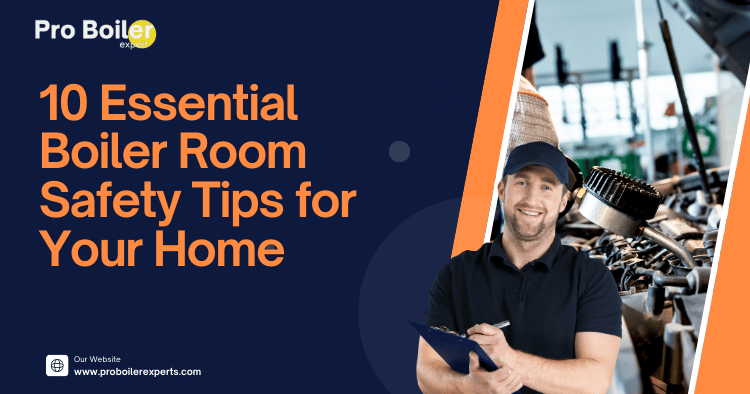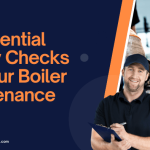Table of Contents
- Understand Your Boiler System
- Regular Maintenance is Key
- Install Carbon Monoxide Detectors
- Keep the Area Clear
- Know Your Emergency Shut-Off
- Educate Your Family
- Check for Leaks Regularly
- Use the Right Fuel
- Avoid DIY Repairs
- Hire Professionals for Inspections
Boiler rooms are essential for heating your home, but they can also pose safety risks if not properly managed. Here are ten essential safety tips to help ensure your boiler room remains a safe environment for you and your family.
1. Understand Your Boiler System
Before you can implement effective safety measures, it’s crucial to understand how your boiler system works. Familiarize yourself with the different types of boilers – such as combi, system, and regular boilers – and their specific functions. Understanding how your system operates helps you recognize when something is amiss.
Did You Know? A well-informed homeowner can often spot potential problems before they escalate, saving both time and money.
FAQ: What type of boiler do I have?
To find out what type of boiler you have, check your user manual or look for model numbers usually located on the boiler itself. If you’re still unsure, consult a heating professional.
2. Regular Maintenance is Key
Regular maintenance is the cornerstone of boiler safety. Schedule annual inspections and tune-ups with a certified technician to ensure your boiler runs efficiently and safely. A well-maintained boiler reduces the risk of breakdowns and potential hazards.
Maintenance Checklist:
| Task | Frequency |
|---|---|
| Inspect and clean the boiler | Annually |
| Check pressure relief valve | Annually |
| Bleed radiators | At least once a year |
| Test safety controls | Annually |
For more on maintenance tips, check our article on essential boiler maintenance tips to keep your system efficient.
Tip: Keeping a maintenance log can help track when services were performed and remind you of upcoming tasks.
3. Install Carbon Monoxide Detectors
Carbon monoxide (CO) is a colorless, odorless gas that can be deadly. Installing CO detectors near your boiler room and sleeping areas is essential. Make sure to test the detectors monthly and replace batteries at least once a year.
FAQ: Where should I install CO detectors?
CO detectors should be installed on every level of your home, especially near sleeping areas. Follow the manufacturer’s instructions for specific placement guidelines.
Safety Reminder: Make it a habit to test your CO detectors monthly. A small action can save lives.
4. Keep the Area Clear
Your boiler room should be free from clutter. Avoid storing flammable materials, such as gasoline or cleaning supplies, near the boiler. Keeping the area clean allows for better airflow and reduces fire hazards.
Visual Aid: Safe Boiler Room Layout
*(Note: Replace with actual image link)*
Warning: A cramped boiler room can lead to overheating and increased fire risk. Prioritize space and safety.
5. Know Your Emergency Shut-Off
Familiarize yourself with the location of the boiler’s emergency shut-off valve. In case of an emergency, knowing how to quickly turn off the boiler can prevent accidents. Make sure all family members know where it is and how to operate it.
FAQ: How do I turn off my boiler in an emergency?
Typically, the shut-off valve is a lever or knob located near the boiler itself. Turn it to the off position, usually marked clearly. If in doubt, consult your boiler’s user manual.
Quick Tip: Practice emergency shut-off procedures with your family to ensure everyone is prepared in case of an emergency.
6. Educate Your Family
Everyone in your household should be aware of boiler safety. Educate your family members about what to do in case of a boiler-related emergency. Conduct regular drills to ensure everyone knows the emergency procedures.
FAQ: What should I teach my children about boiler safety?
Teach children the importance of not playing near the boiler room. Explain the dangers of heat and gas exposure and encourage them to notify an adult if they notice any unusual smells or sounds.
Family Safety Tip: Role-playing emergency scenarios can help children react calmly and effectively in real situations.
7. Check for Leaks Regularly
Regularly check for leaks around your boiler, as water accumulation can lead to significant damage and safety hazards. If you notice puddles or damp spots, contact a professional to assess the situation.
FAQ: How do I know if my boiler is leaking?
Signs of a leaking boiler include water pooling around the unit, a drop in water pressure, or unusual sounds like hissing. If you suspect a leak, shut off the boiler and call a technician immediately.
Important Note: Timely leak detection can prevent more extensive damage and costly repairs down the line.
8. Use the Right Fuel
Ensure you’re using the correct fuel for your boiler. Using the wrong type of fuel can lead to inefficiency, increased costs, and safety hazards. Always refer to your boiler’s user manual for guidance.
FAQ: What should I do if I accidentally use the wrong fuel?
If you’ve used the wrong fuel, immediately stop using the boiler and contact a qualified technician for assistance. They can help assess any potential damage and safely drain the incorrect fuel.
Pro Tip: Always double-check your fuel type before refueling to avoid costly mistakes.
9. Avoid DIY Repairs
While DIY projects can be fun, boiler repairs should always be left to the professionals. Attempting to fix a boiler without the proper expertise can lead to serious accidents or further damage.
FAQ: How do I find a qualified technician?
To find a certified technician, seek recommendations from friends or family, or check online directories such as the Heating, Refrigeration and Air Conditioning Institute of Canada (HRAI). Always check for licenses and reviews.
Caution: The risks associated with DIY boiler repairs far outweigh the potential savings. Always opt for professional help.
10. Hire Professionals for Inspections
Finally, always hire professionals for routine inspections and maintenance. They have the training and experience to identify potential issues that may not be apparent to the untrained eye. Regular expert check-ups can save you money and enhance your safety.
FAQ: How often should I have my boiler inspected?
It’s recommended to have your boiler inspected at least once a year, ideally before the winter season. This ensures your system is ready for the cold months ahead. For detailed insights on boiler safety regulations, visit our article on boiler safety regulations.
Reminder: Regular inspections are an investment in your home’s safety and efficiency. Don’t skip them!
By following these essential boiler room safety tips, you can help keep your home and family safe. A little knowledge and proactive maintenance go a long way in preventing accidents and ensuring your boiler operates efficiently. For more information on boiler safety, check out resources from the U.S. Consumer Product Safety Commission or the American Society of Heating, Refrigerating and Air-Conditioning Engineers (ASHRAE).
Stay safe and warm!





